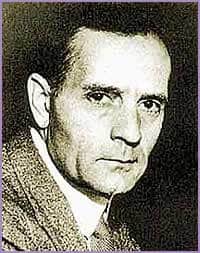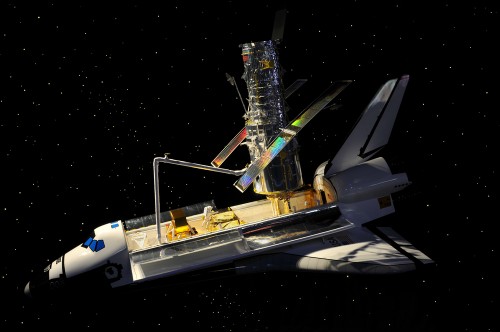60 years since the death of the astronomer Edwin Hubble
 Two years ago, the Nobel Prize in Physics was awarded to three astronomers from the USA and Australia, for the discovery that our universe is expanding at an accelerated rate. However, the very idea that the universe is expanding at all, was an idea that brought about a real revolution in human perception. Also the idea that the universe is much bigger than our galaxy - the Milky Way - and that it is only one of many like it, was not at all obvious until less than a century ago, until the observations of the one who was defined as "the greatest astronomer of the twentieth century".
Two years ago, the Nobel Prize in Physics was awarded to three astronomers from the USA and Australia, for the discovery that our universe is expanding at an accelerated rate. However, the very idea that the universe is expanding at all, was an idea that brought about a real revolution in human perception. Also the idea that the universe is much bigger than our galaxy - the Milky Way - and that it is only one of many like it, was not at all obvious until less than a century ago, until the observations of the one who was defined as "the greatest astronomer of the twentieth century".
Athlete and lawyer
Edwin Powell Hubble was born on November 20.11.1889, 1910 in the state of Missouri. From childhood he was an outstanding athlete, especially in basketball and athletics. At the same time, he showed great interest in science, and especially in astronomy, partly thanks to his grandfather, who built a telescope for him for his eighth birthday. He finished high school in Illinois, where the family moved. When he asked to study science at university, the father insisted that he study law, so that he would have a secure income. Hubble agreed, but along with studying law at the University of Chicago, he also took courses in physics and astronomy. During his studies, Hubble worked in the laboratory of the physicist Robert Milliken (later a Nobel laureate in physics), and thanks to Milliken's recommendation, he received a prestigious scholarship to study at Oxford in Great Britain in 1913. He also continued his law studies there, following his promise to his dying father, and also studied for a master's degree in Spanish. His studies were interrupted with the death of his father in 1919, and he returned to the US and began working as a parent to help support his mother and brother. After their financial situation stabilized, Habel - finally - turned to fulfill his dream, completing a master's degree and a doctorate in astronomy. In his doctoral thesis, he studied and classified the types of nebulae - bodies that appear as a blurred spot in the night sky, unlike the bright stars. After completing his doctorate, Hubble got a job at the elaborate observatory on Mount Wilson in California, but before he started his work, the United States entered the First World War. Hubble enlisted in the army and went to Europe, and even though he arrived too late to participate in the fighting itself, he did not return to Mount Wilson until 30, to begin - at the age of XNUMX - his research work.
The big debate
At the beginning of the twentieth century, and actually even earlier, astronomers were divided on the question of the nature of the nebulae. One group believed that these are relatively small bodies located within the boundaries of the Milky Way - perhaps on its edge - and that there are almost no stars outside the Milky Way, which is the only galaxy in the universe. The opposing group believed that the universe is much wider, and the nebulae are simply very distant galaxies. To settle the bitter dispute, representatives of both sides were summoned in 1920 to the "Great Debate" - a public confrontation in Washington, DC. Both sides presented their positions and the scientific evidence supporting them, but no decision was reached in the confrontation, and the dispute remains. Hubble, who wanted to obtain solid evidence to settle the dispute, continued with careful observations of the nebulae, and in 1923 he identified a Cepheid star in the Andromeda nebula - a star whose light intensity brightens and dims cyclically. Thanks to a breakthrough achieved a few years earlier by the brilliant astronomer Henrietta Leavitt, such cupids could be used as cosmological distance markers. Hubble calculated and found that the star he discovered - and therefore also the Andromeda Nebula in which it resides - is about 900,000 light years from Earth. Since the diameter of the Milky Way is estimated at 100,000 light years, there is no doubt that Andromeda is much further away, and can only be an independent galaxy (new measurements with a sophisticated instrument that Hubble did not have, in recent years, suggested that it is even further away from us: about 2.5 million light years ). The discovery of Hubble in 1923 resolved the great and prolonged debate, and illustrated - through one focused observation - that our galaxy is but one of many galaxies in the vast expanses of the universe.
continues to expand
At the same time as Hubble's work, another astronomer, Vesto Slipher, made an impressive breakthrough of his own. He measured the speed of the nebulae using a spectroscope - a device that analyzes the light emission of stars and other celestial bodies, and makes it possible to measure their speed and direction using the Doppler effect. According to this effect, waves approaching us will appear denser, with a higher frequency than the "real" frequency, while waves moving away from us will arrive at a lower density. This effect in sound waves explains, for example, the change in the siren sound of an ambulance approaching us or moving away from us. It can also be measured in light waves - at much higher speeds. In bodies approaching us, the color spectrum will move towards the shorter wavelengths, and will appear bluer. In contrast, receding bodies are in the longer wavelength range of visible light, and therefore appear redder. Sleeper discovered that many nebulae - now we already know that these are galaxies - are moving away from us at an enormous speed, sometimes thousands of kilometers per second.
Scientists who until now believed that the universe was more or less static, began to develop wild theories in an attempt to explain the movement of galaxies, and Hubble - who was already a world-renowned astronomer - felt obliged to try and solve the problem with the help of the sophisticated telescope on Mount Wilson. After verifying Sleeper's observations, he began looking for a relationship between their speed and their distance from us, and soon found a clear relationship, which was named "Hubble's Law": the farther a galaxy is from us, the higher its speed. This fascinating discovery, published in 1929, had two scientific consequences that shook the world of astronomy, and our perception of the entire universe. One, if the galaxies continue to move rapidly away from each other, this means that the universe is not static, but expanding and expanding, like an inflating balloon. Second, if there is such a close relationship between speed and distance, this means that at a certain point in time, all the galaxies were found in the same place. Hubble calculated that this situation prevailed for 1.8 billion years, and in his sensational discovery laid the first foundations for the "Big Bang" theory (today it is accepted that the big bang happened 13.8 billion years ago).

Einstein was convinced
Hubble was not the first to propose the idea of an expanding universe, and the idea that the universe began at a certain time, derived from it. Scientists who did not receive much recognition during their lifetime, such as Georges Lemaitre from Belgium or Alexander Friedmann from Russia, predicted that it is possible that the universe is expanding and that it started from one fixed point. A much more famous scientist, Albert Einstein, who published the theory of general relativity in 1916, realized that his equations predict the collapse of the universe into itself due to the gravity of its components. Since he believed that the universe is static, he added to the formulas the cosmological constant, which expresses a repulsive force and contradicts the collapse of the universe. In 1931, during a visit to Mount Wilson, Einstein declared that he was convinced by Hubble's observations (and that Friedman and Mater were right in their predictions). He deleted the cosmological constant from the equations, and later called it "the grossest mistake I made in my life". The Big Bang idea continued to receive scientific reinforcements, until it was finally confirmed by measurements of the cosmic background radiation in the early 90s.
A star in the Hollywood sky
At the same time as his scientific work, Hubble enjoyed a colorful and glamorous social life. In 1924 he married Grace Burke, the daughter of a Californian banker who was extremely rich. His financial position and his scientific success made them one of the most powerful couples in Hollywood (which Mount Wilson is very close to). They socialized with actors and other celebrities, and invited many famous guests to the observatory. In 1937, Hubble was the guest of honor at the awards ceremony of the American Film Academy (the Oscars), was presented to the audience and received the applause of the best Hollywood stars. However, despite his publication, Hubble did not abandon his astronomical work throughout his life, he continued to study distant galaxies and also discovered the asteroid "Cincinnati". Only during World War II did he break away from cosmology and enlist in ballistic research for the American Army. In 1949 he suffered a heart attack, but soon returned to his work. Four years later, he was overcome by a blood clot in his brain, and Hubble passed away on September 28.9.1953, 60 - XNUMX years ago today. At his request, no funeral was held for him, and he was buried in an unmarked grave. His burial place is unknown to this day.
For many years Hubble fought against the Nobel Prize Committee for Physics, which refused to recognize astronomy as a field of physics, and to recognize the astronomers' right to the prestigious prize. Shortly before his death, the committee - finally - accepted his position, and even decided to award him the prize. However, the decision was made too united for him: he did not have time to hear about it, nor to receive the award, which is not awarded after death. Hubble won many other awards in his lifetime, and at the end of the last century he received what may be the greatest honor for an astronomer. The first space telescope - placed in orbit around NASA in 1990, bears his name. For more than twenty years, the Hubble Telescope has been making enormous contributions to the study of the universe, a fitting tribute to one who many agree was the greatest astronomer of the 20th century.

4 תגובות
What amazed me the most was that he was able to help support his mother and brother as a parent dancer
Asaf. It just sounds nice. The truth is a little different.
Einstein believed as they believed then that the universe has always existed, therefore it is stable and the distances between the stars do not change.
Following this belief he introduced the cosmological constant. And that's what he meant when he said he was wrong, he was wrong by not being able to free himself from the ancient belief that the world is infinite.
I just wanted to mention that even though Einstein was convinced that the cosmological constant was a mistake today there is a tendency to put it back into the equations to deal with the dark energy problem.